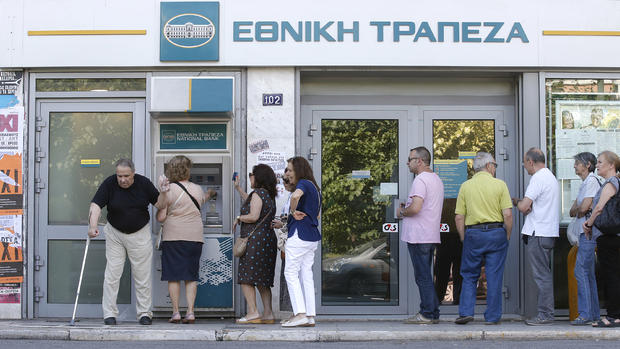Stocks hit by Greece; Wall Street's worst day of year
U.S. stocks plunged on Monday, with the Dow industrials sliding into the red for the year, as investors fretted over the implications of a potential Greece exit from the eurozone.
The market drop, the largest single-day decline this year, came after Greek Prime Minister Alexis Tsipras this weekend called for a July 5 referendum on a proposed bailout by the country's creditors, heightening the odds that it could default on its sovereign debt and be forced to leave the 19-member currency bloc.
Turning negative for the quarter, the Dow Jones industrial average lost 350 points, or 2 percent, to 17,597. The Standard & Poor's 500 index gave up 44 points, or 2.1 percent, to 2,058, with all 10 of its industry groups in the red. The Nasdaq composite fell 122 points, or 2.4 percent, to 4,958.
Bond prices rose. The yield on the 10-year Treasury note fell to 2.32 percent.
The declines were even steeper in Europe. Benchmark indexes in Germany and France closed over 3 percent lower.
The political and economic turmoil in Greece led the Standard & Poor's rating agency to cut the country's credit grade by another notch into junk status, saying it now projects a 50 percent chance of Greece departing the euro area.
"The markets are lower on the latest events in Greece, and that call for a referendum was rather a surprise. But considering the prospects of Greece likely to default on its IMF payment tomorrow, the markets are not reacting in a panic mood," Peter Cardillo, chief market economist at Rockwell Global Capital, said.
"The general feeling there, and I share that view, is that the Greece situation when put to a referendum will probably end in favor of the euro. If we're wrong on that, and it doesn't end that way, it could be a problem and set the state for the market to correct," he added.
The government in Athens on Monday closed banks after talks about rescue aid with its creditors broke off on Friday, with the European Central Bank freezing the amount of emergency funds available to Greek lenders Sunday.
The Greek stock market and the country's banks will remain shut until at least July 6, the day after a vote is scheduled on proposals required to resume bailout aid.
Data released Monday showed contracts to purchase previously owned homes climbed for a fifth month in May, illustrating ongoing strength in the real-estate sector.
